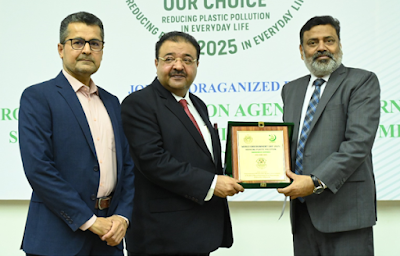Sindh to enforce province-wide plastic bag ban from June 15
Crackdowns planned in major cities as officials warn of no leniency for violators
IV Report
KARACHI: Senior government officials have announced that from June
15, no leniency will be shown to manufacturers, sellers, or users of plastic
bags across Sindh, as the province begins a strict crackdown against plastic
pollution.
Speaking at a seminar held at the
University of Karachi (KU) on June 4 in connection with World Environment Day
(June 5), Sindh’s Secretary for Environment and Climate Change Agha Shahnawaz
Khan and Director General of the Sindh Environmental Protection Agency (Sepa)
Waqar Hussain Phulpoto reaffirmed the provincial government’s resolve to
implement a complete ban on plastic carrier bags.
They said that crackdowns may be
launched in major cities — including Karachi, Hyderabad, Larkana and Mirpurkhas
— targeting the manufacture, stockpiling, marketing, and use of all types of
plastic bags. “Plastic poses severe threats to our ecosystem, and we are ready
to act firmly,” said Secretary Agha Shahnawaz, adding that the government had
held extensive consultations with stakeholders to ensure effective
implementation of the decision.
The seminar, titled Reducing Plastic Pollution, was jointly organised by the KU Department of Mass Communication and Sepa. KU Vice Chancellor Prof Dr Khalid M Iraqi was the chief guest.
The decision to impose the ban stems
from an April 15 meeting of the Sindh Cabinet, which approved the environment
department’s proposal for a province-wide prohibition on plastic bag
manufacturing, sale, and use. The ban, applicable to all types and sizes of
plastic carrier bags (including non-degradable and oxo-degradable varieties),
comes into effect 60 days after the Cabinet’s approval. A formal notification
was issued on April 30, amending the relevant rules.
At the KU seminar, officials and
academics warned about the environmental and health risks posed by plastic
waste. Secretary Agha Shahnawaz described plastic pollution as a global
environmental challenge, stressing that it pollutes land, water, and even the
food chain. He called for collective action to rid the environment of plastic
bags.
KU Vice Chancellor Prof Khalid Iraqi
highlighted the alarming fact that 98% of plastic bags are non-biodegradable
and non-recyclable. He emphasised the need to cut off public access to plastic
bags at retail points and to launch widespread awareness campaigns about their
dangers.
Sepa DG Waqar Phulpoto said that
industries were initially given time to develop eco-friendly alternatives.
"We are now in the second phase, focusing on enforcement and
elimination," he said. He reiterated Sepa’s commitment to promoting the
“No Plastic Carrier Bags” policy and urged cross-sector cooperation to create a
cleaner and more sustainable Sindh.
Phulpoto also underlined the agency’s dual focus on industrial monitoring and awareness-raising, especially through programmes in educational institutions.
Speaking on the broader implications
of environmental responsibility, KU Dean of the Faculty of Arts and Social
Sciences, Prof Dr Samina Saeed, said the issue was not limited to science and
policy. “It is a social obligation,” she said, calling for grassroots education
and community engagement to foster long-term environmental stewardship.
Former chairperson of KU’s Department of Geography, Prof Dr Jamil Hasan Kazmi, pointed out the complexity of enforcing environmental policies in urban settings like Karachi. He noted that environmental missteps in the past — such as the unchecked introduction of decorative or invasive plant species — illustrate the need for informed, research-based policymaking






Comments
Post a Comment